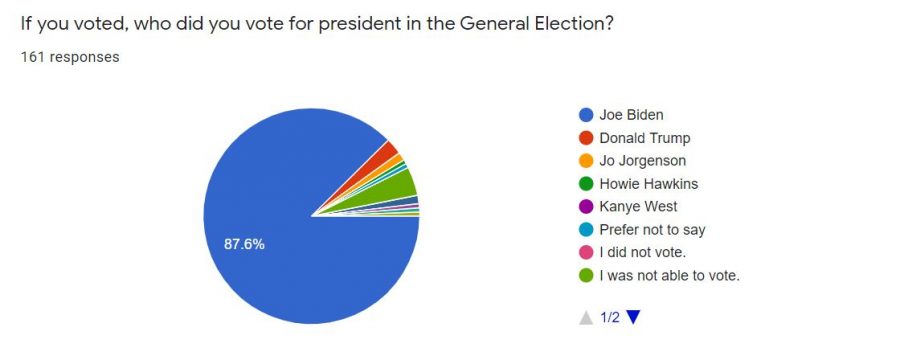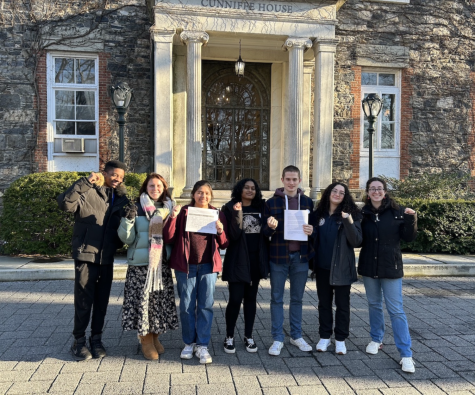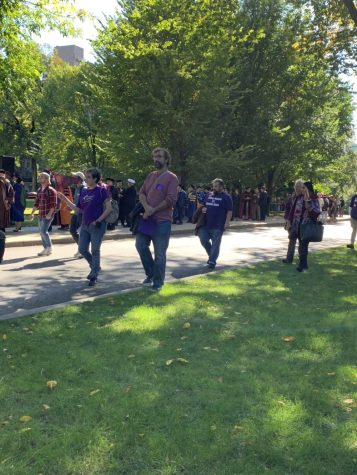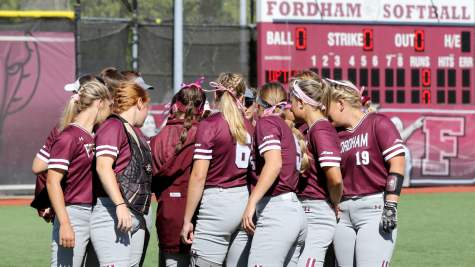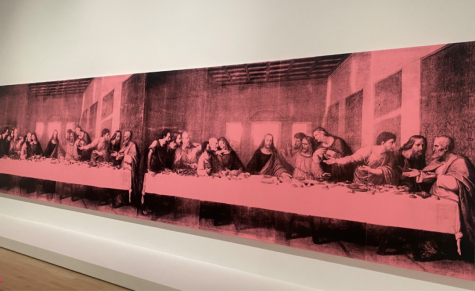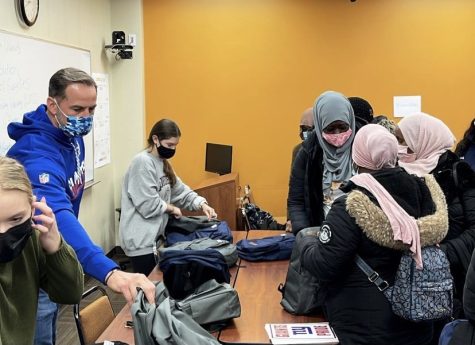Fordham Students Share Opinions About the 2020 Presidential Election
Out of 161 student responses, nearly 88% stated that they had voted for Democratic Candidate Joe Biden in this year’s presidential election, compared to the 80% who identified as a Democrat. (Mackenzie Cranna/The Fordham Ram)
The 2020 presidential election ended when former Vice President Joe Biden was announced as the next president of the United States on Nov. 7. Following this year’s election, The Fordham Ram conducted a survey of 161 Fordham students to see what their opinions were regarding the 2020 election.
128 students, or 79.5%, said they were affiliated with the Democratic Party. 8.7% said they do not affiliate with any political party, and 6.2% said they were Independent. 4.3% said they were affiliated with the Republican Party.
Back in February, The Fordham Ram conducted a poll specifically about the primaries. In that poll of 119 students, 70.6% of students said they planned to vote in the primaries. In The Fordham Ram’s most recent poll, 77.6% of students said they did vote in the primaries. 14.9% said they could have, but did not, and 7.5% said they cannot vote.
141 students, or 87.6%, polled said they voted for Joe Biden in the general election. Four students, or 2.5%, said they voted for Donald Trump. While the largest group of students said they voted for Joe Biden, the second largest group of people said they were not able to vote.
Claire McDonnell, FCRH ’21, president of College Democrats, said those numbers surprised her.
“In my experience, Fordham students represent a wide range of political beliefs so I would not expect such a majority of respondents to have voted for Biden,” she said. “I wonder if this is the result of who responded to the survey or more conservative students voting for Biden this election cycle.”
107 people, or 66.9%, said the person they voted for was not their first choice candidate. Monika McDermott Ph.D., a political science professor at Fordham, said she was not surprised by that number.
“In talking with my students this semester it is clear that many, if not most of them preferred Bernie Sanders, or even Elizabeth Warren,” McDermott said. “Many seemed to be holding their noses and voting for Biden, however, because they wanted Trump out so badly.”
92.5% of respondents said COVID-19 had a large influence on the election. 75.2% of respondents said racial injustice was a major influence on the election. 52.2% of respondents said climate change was a major influence, and 51.6% of respondents said healthcare was a major influence.
Other issues that students cited as having a major influence on the election included women’s and LGBTQ+ rights.
When asked if anything from the election was particularly shocking, many students responded saying no. McDonnell said she agrees with those respondents.
“Not only was it widely predicted that Biden would win, but Donald Trump’s failure to handle the coronavirus, among a host of other issues, definitely swayed many uncertain voters to turn out for Biden,” she said.
McDermott said the answer to this question depends on the definition of “shocking.”
“From a political science perspective, the turnout figures alone are incredibly surprising,” she said. “As for how the vote went, most of the polls predicted a similar outcome to what we got, so in some ways that was less surprising, at least after election night itself.”
Boris Heersink, assistant professor in the department of political science, said he doesn’t think the election was shocking because Biden won, but other components of it were shocking. He specifically cited high voter turnout for both parties, particularly the fact that Donald Trump impressively increased his votes from 2016.
The other thing he said he found shocking was the decline of Democratic support among some non-white voting groups — particularly Latinx voters in Florida and Texas specifically — and among Black men.
“While Biden did considerably better than Clinton in the suburbs, the Democrats have long relied on very high support among non-white voters and these results suggest that they should be concerned about maintaining the ‘majority minority’ coalition,” said Heersink.
Many respondents cited flipped states such as Georgia, Arizona and Pennsylvania as shocking. Others noted voter turnout and how close the race was as particularly surprising.
“I was pleasantly surprised to see a significant increase in voter turnout from demographics that usually do not vote,” said one respondent.
In the last section of the survey, students were asked if they had any additional opinions they would like to share. Some students discussed voter suppression, sharing that they were not able to vote in the primaries. Even more respondents noted voter turnout for this election.
“It was really inspiring to see the biggest turnout for an election in history,” said one respondent. “I hope people agree that one of the big lessons of this election was how important community organizing and combating voter suppression is.”
Multiple people mentioned Senator Bernie Sanders and the fact that they think he could’ve won.
McDermott said she respectfully disagrees with those students. She said exit polling and pre-election polling show that Biden won because he was more moderate than other Democrats.
“I think it says more about our students’ preferences than about the election,” she said. “They’re idealists at heart, but pragmatic when they want to be. Sometimes that’s what’s necessary in politics, no matter which side you’re on.”
Heersink said he doesn’t doubt that Sanders could have won the election as well.
“By far most voters base their voting decisions exclusively on their partisanship, and accept whoever the party’s candidate is,” he said. “Additionally, the election was more a referendum on Trump than it was one on Biden. That is, most people’s votes were probably more about whether they wanted to keep or get rid of Trump than it was about their support of Biden specifically.”
Heersink said Sanders might have been able to further increase turnout among younger voters, but he could also see him turning off some of the middle class suburban voters that helped Biden win in core swing states.
In general, McDonnell said she thinks Fordham students took away how important elections are and how participating in them can facilitate change.
“Not only was this the first presidential election that many Fordham students were able to vote in, but the stakes felt especially high,” she said.

Hasna Ceran is a junior double majoring in economics and Middle East studies. She began by writing the USG Column for Volume 101 and served as an Assistant...





































































































































































































